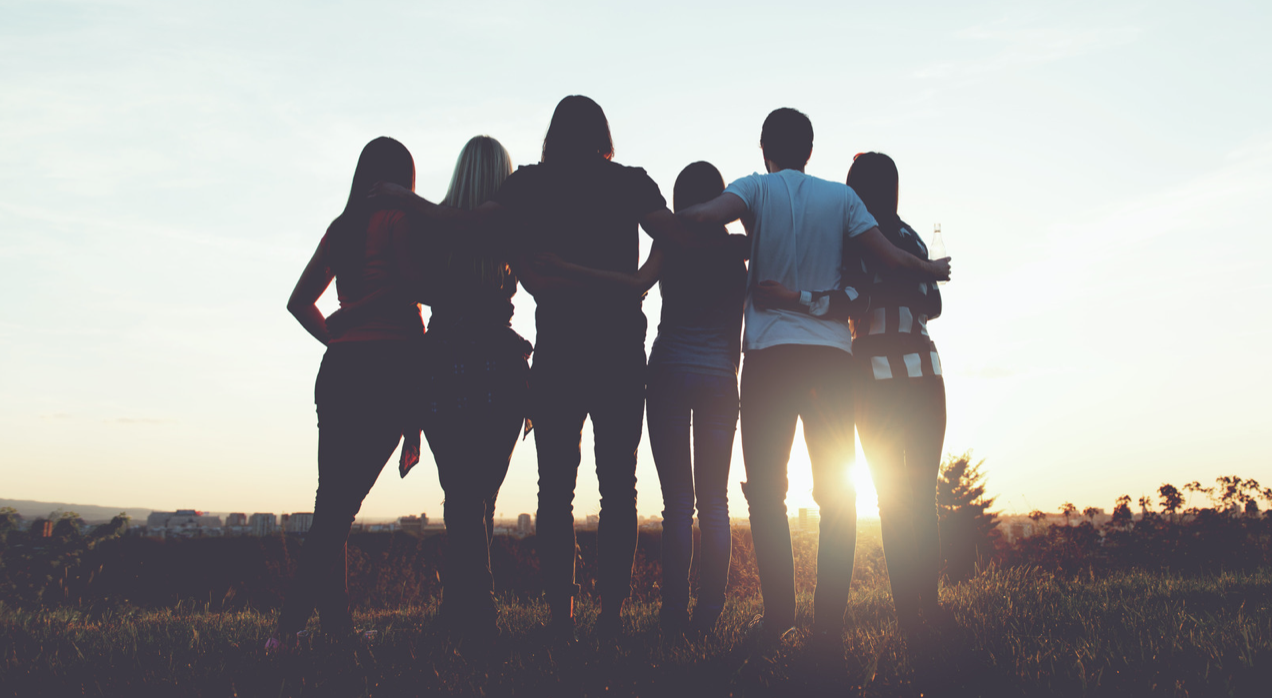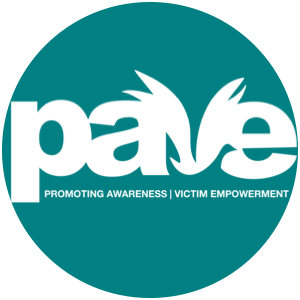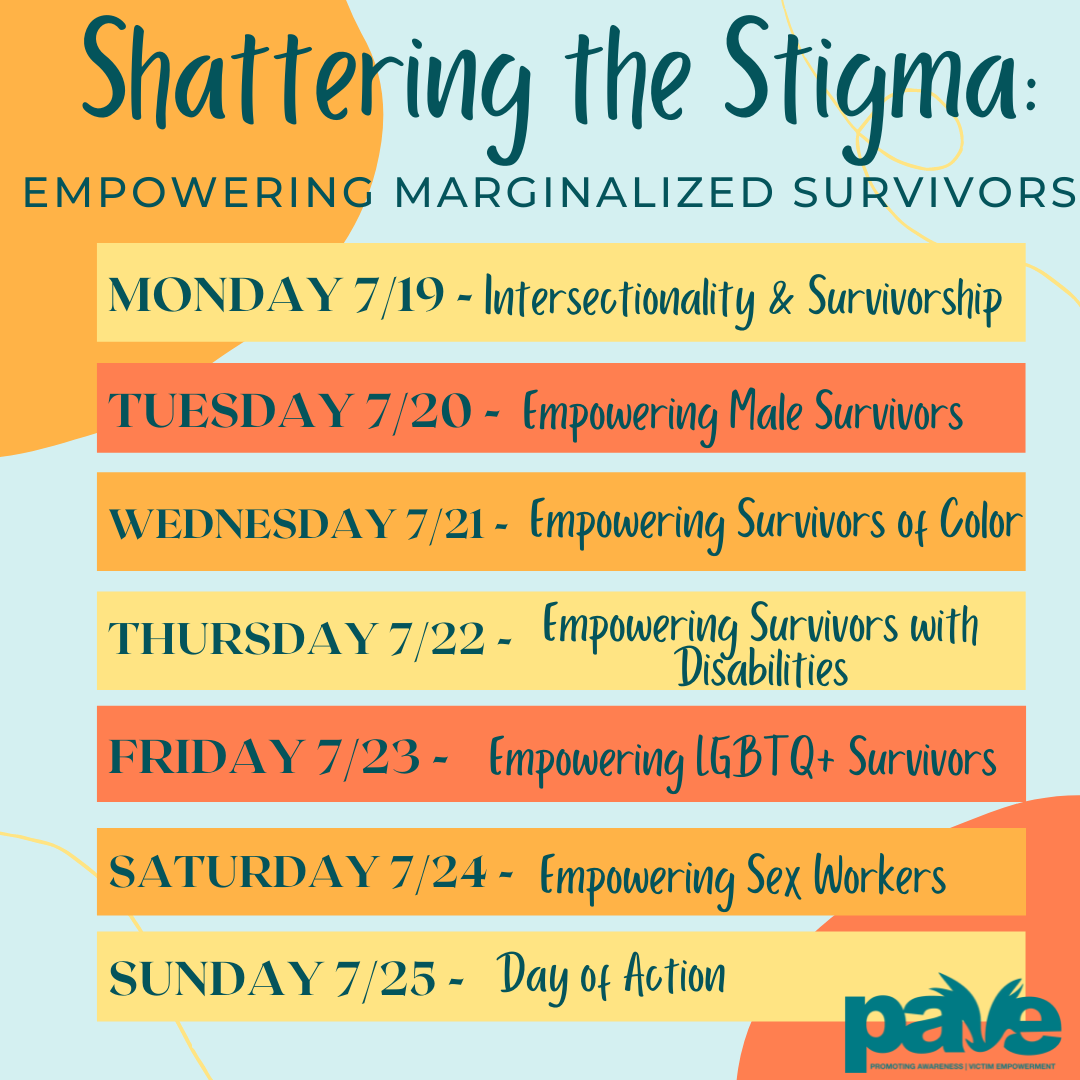
Shattering the Stigma: Empowering Marginalized Survivors
Shattering the Stigma: Empowering Marginalized Survivors is a groundbreaking national campaign dedicated to raising awareness and shattering the silence about sexual violence in marginalized communities. The goal of our Shattering the Stigma campaign is to educate and raise awareness on intersectionality, male survivors, survivors of color, survivors with disabilities, LGBTQ+ survivors, and sex workers.
Calendar of Events
Looking to make an impact this week?
Check out our campaign calendar!
Survivorship & Intersectionality
Intersectionality: (n.) used to describe how race, class, gender, and other individual characteristics “intersect” with one another and overlap.
Most survivors don't fall into one single stigmatized community. All survivors are multifaceted, and those in intersections may be more at risk due to marginalization.
Sexual assault affects not only women, but men, people of color, people with disabilities, LGBTQ+ people, and sex workers. We need to shatter the stigma and uplift these voices in our advocacy.
SV activism tends to focus on straight, cis, able-bodied individuals. The reality of this issue extends to everyone regardless of race, gender, ability, class, sexuality, or profession. We are working to empower survivors in communities that are often overlooked.
Male Survivors
Information about male sexual violence victimization and support
Male sexual violence victimization is an extremely under-reported crime, yet 1 in 6 males will experience sexual victimization at some point in their lives.
Due to the effects of the patriarchy and gender-based expectations, many people believe that men should be able to "Fight off" their attackers or it was caused by their sexual orientation. Both beliefs are false.
Perpetrators can be any gender identity, sexual orientation, or age, and they can have any relationship to the victim. Like all perpetrators, they might use physical force or psychological and emotional coercion tactics.
How to provide support to male survivors
Listen to their experiences without judgement.
Validate their emotions and maintain that you believe them.
Express to them that you care for them and you are here for them.
Don't ask for specific details of their assault. This can be extremely triggering.
Provide other resources that may be useful for them.
Resources for Male Survivors: 1in6.org, MaleSurvivor.org, and RAINN.org
Survivors of Color
Resources for Survivors of Color: End Rape on Campus, RAINN, Survivors.org
Statistics & Barriers to Reporting
Black Survivors
More than 20 percent of Black women are raped during their lifetimes—a higher rate than among women overall.
12 percent of Black males experience sexual assault
Barriers to Reporting: Fewer support systems and resources, reporting could make them face more complications, fear of the police, and fear of not being believed
Latinx Survivors
Latinx/Latina girls reported that they were likely to stop attending school activities and sports to avoid sexual harassment
7.4 percent of Latinx males will experience sexual assault
Barriers to Reporting: Lack of bilingual and bicultural direct service staff and volunteers- all they will most likely hear is "Sorry we don't speak Spanish," Lack of bilingual and bicultural trainers - no one to trust or speak to.
Asian Survivors
Between 21-55% of Asian women report experiencing intimate physical and/or sexual violence in their lifetime.
Barriers to Reporting: Fewer support systems and resources, fear of police and not being believed or taken seriously, language barriers, and cultural stigma
Indigenous Survivors
96% of the Indigenous female survivors experience violence from a non-Indigenous perpetrator
Barriers to Reporting: Fewer support systems and resources, language barriers, and cultural stigma
Survivors with Disabilities
Many cases of abuse against people with disabilities go unreported because of unique difficulties in accessing help, resources, and disbelief by authorities.
Over 80% percent of women with disabilities have been sexually assaulted. 50% of those women have been assaulted more than ten times.
In 2013, the rate of violent victimization against people with disabilities was at least double the rate for those without disabilities.
People with cognitive disabilities experience the highest rates of violence of all people with disabilities. Yet, only 3% of sexual abuse cases involving people with developmental and cognitive disabilities are ever reported.
Between 97 - 99% of abusers are known and trusted by survivors.
32% are family members.
44% are caretakers, home health aides and living facility attendants.
Resources for Survivors with Disabilities: American Association of People with Disabilities (AAPD), Center for Disability Rights, Disability Visibility Project, Disability Action, RAINN
Empowering LGBTQ+ Survivors
Resources for LGBTQ+ Survivors: Survivors.org, Forge-Forward.org, TheTrevorProject.org, LGBTQ National Hotline
LGBTQ+ Women
44% of lesbians and 61% of bisexual women experience rape, physical violence, or stalking by an intimate partner, compared to 35% of straight women.
22 percent of bisexual women have been raped by an intimate partner, compared to 9 percent of straight women
LGBTQ+ Men
26% of gay men and 37% of bisexual men experience rape, physical violence, or stalking by an intimate partner, compared to 29% of straight men
40% of gay men and 47% of bisexual men have experienced sexual violence other than rape, compared to 21% of straight men
LGBTQ+ BIPOC
According to the 2015 US Transgender Survey respondents:
47% of transgender people are sexually assaulted at some point in their lifetime.
65% of indigenous, 59% of Multiracial, 58% of Middle Eastern, and 53% of Black transgender respondents were sexually assaulted in their lifetime.
48% of LGBT students of color reported being verbally harassed in school, while 15% reported being physically assaulted.
Most LGBT students of color reported feeling unsafe at school, with the majority of Native American students at 74%.
Empowering Sex Workers
Sex Work & Intersectionality
Sex workers are often excluded from movements advocating for survivors. Even when sex workers are included in movements, stigma surrounding their profession often results in their needs as survivors being misconstrued.
Sex workers often face conflations between their work and trafficking, individuals trying to “save” them from their profession, as well as victim blaming.
Sex workers face increased rates of violence not because of their profession but rather systemic discrimination and stigma that limits their access to the justice system and survivor resources. Due to the criminalization of their profession, they face an increased vulnerability to police violence.
Sex work is a place of mass intersectionality. It has deep historical roots within the LGBT+ community, with important elders such as Sylvia Rivera and Marsha P. Johnson noting that it was one of the few work opportunities where they did not have to compromise their identity in order to making a living wage. This phenomenon is still very important as sex work intersects with survival for many trans folks who face systematic discrimination in their access to housing, jobs, and medical care.
Resources for Sex Workers who are Survivors: SWOP USA, The Audre Lorde Project, NSWP, The Black Sex Worker Collective, Brilliant Corners
Campaign Advisory Committee
#ShatteringTheStigma was developed by a team of PAVE’s Outreach and Social Media Marketing Interns!








